Working as a woman in the EU CCS may lead to almost equal employment opportunities but not equal pay, according to the latest EUROSTAT Culture statistics on gender-focused EU cultural data.
Available data demonstrate that there is still room for improvement on different dimensions of gender balance in the CCS including cultural employment, gender pay gap, cultural participation and online purchases of cultural goods.
An Ongoing Process towards Gender Balance and Working Conditions in the European CCS
Persisting Gender Pay Gap in 26 from 27 countries
In 2022, cultural employment in the European CCS provided on average 13.5% higher earnings for men than women.
In Slovenia, earnings for CCS professionals were 1% higher for women than men in 2022.
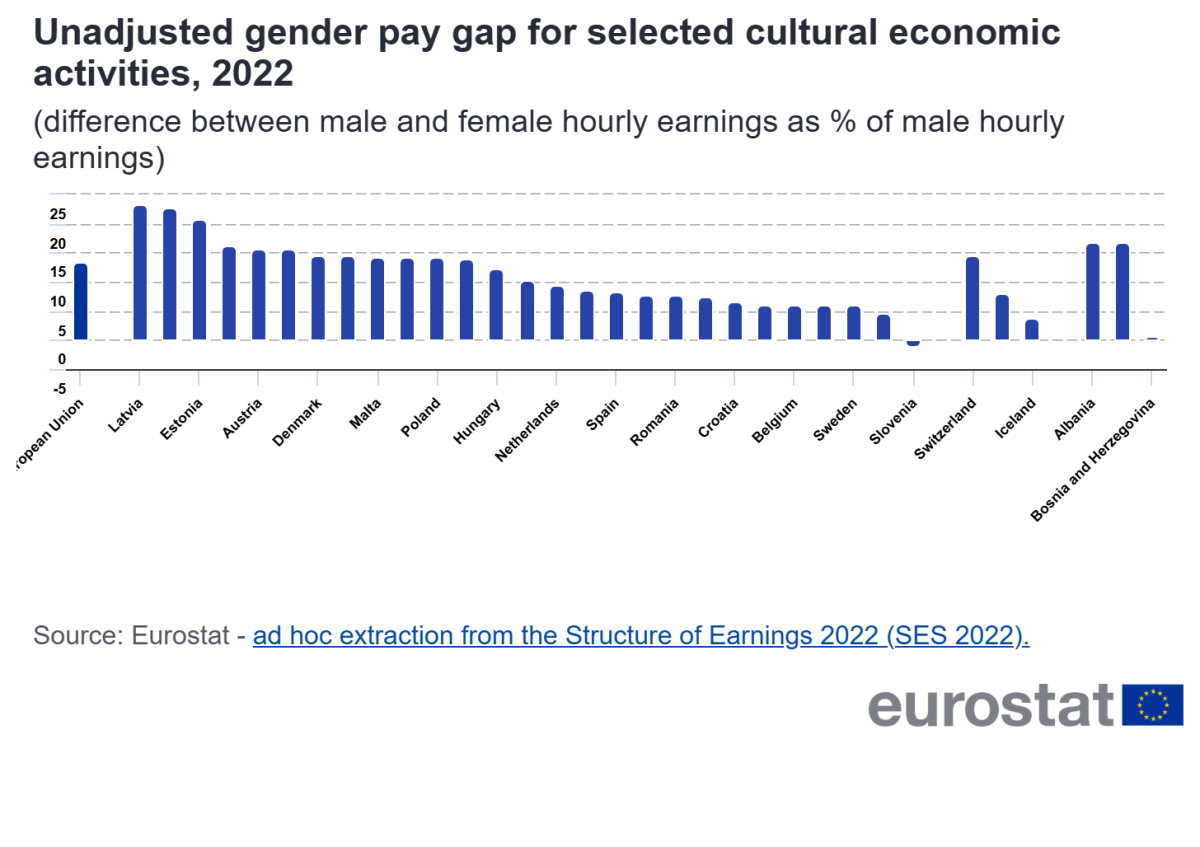 More women are low-wage earners across all EU CCS
More women are low-wage earners across all EU CCS
In lines with the trends in total employment, in 2022 the share of women who were low-wage earners* was higher (16.1%) than men (11.2%) in the CCS overall, and across all the specific sectors measured. Highest inequalities were observed in the 'printing and reproduction of recorded media’ where 25.9% of women earned low wages compared with 12.4% of men. Second most unequal sector was ‘Motion picture, video and television programme production, sound recording and music publishing activities’, where 23.0% of women earned low wages compared with 15.1% of men".
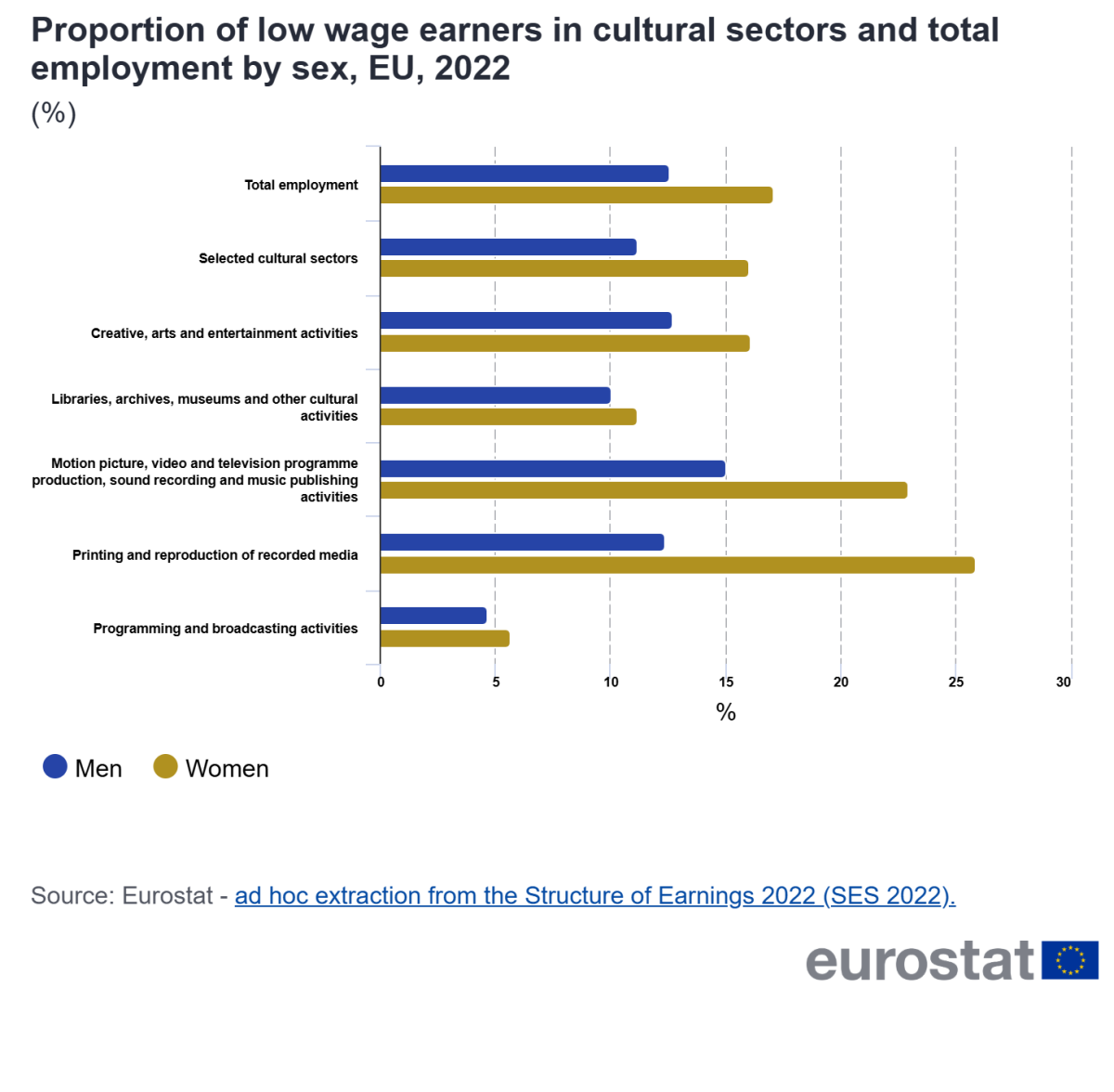 CCS employ more women in managerial positions than other economy sectors, yet still under 50%
CCS employ more women in managerial positions than other economy sectors, yet still under 50%
Over the last ten years, decision-making positions were occupied by 8.7% more women in the CCS than in the rest of the economy.
The percentage of women employed in managerial positions in the EU CCS was 43.9%. While not yet 50%, CCS’ percentage of women in managerial positions is higher than the relevant 35.2% of female managers in total employment.
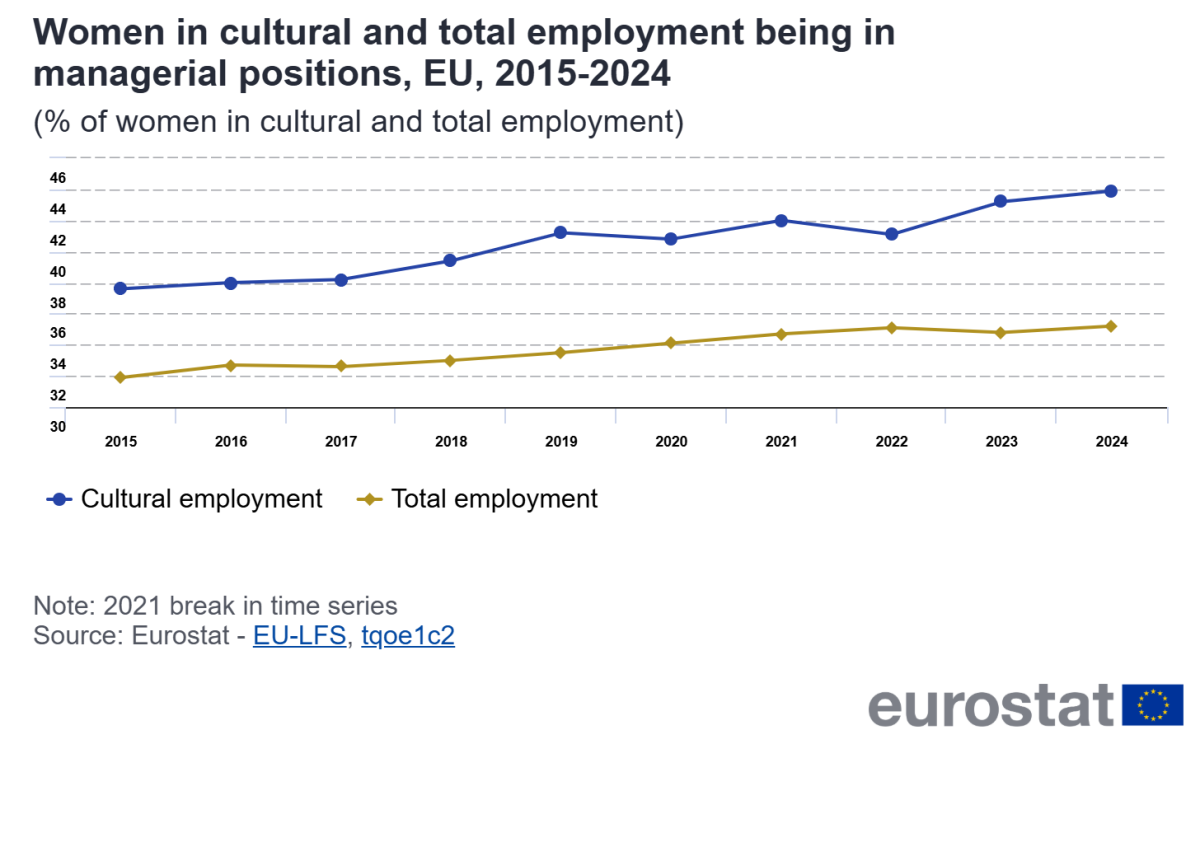 Lowest Gender Employment Gap in 10 years but not in all member states
Lowest Gender Employment Gap in 10 years but not in all member states
In 2024, the employment gap decreased to 0.8%, reaching its lowest in the last ten years, while there were significant differences between member states. Estimates for the total of EU CCS observed a 50.4% for men and 49.6% for women.
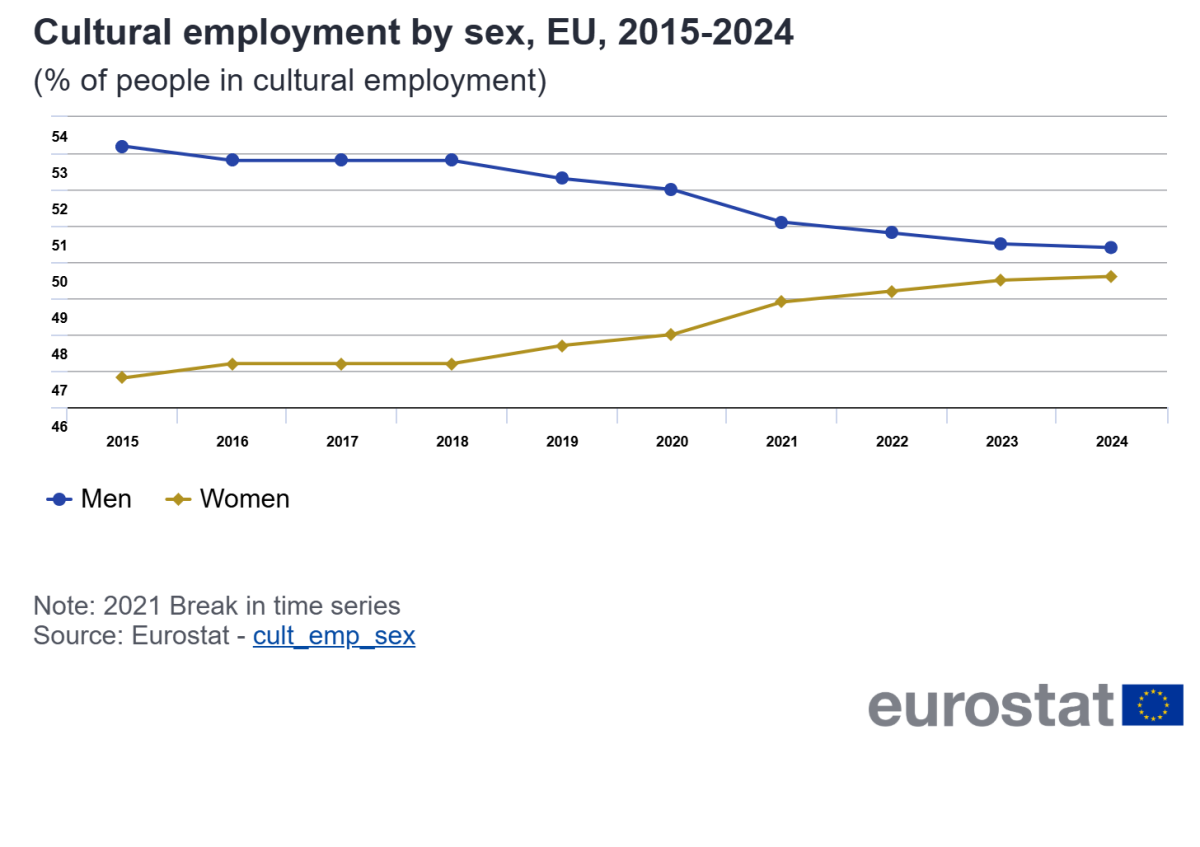 In 2024, the percentage of cultural employment was higher for women than men in 16 EU countries, with the highest difference reaching 32.6% in Latvia and 24.2% in Estonia.
In 2024, the percentage of cultural employment was higher for women than men in 16 EU countries, with the highest difference reaching 32.6% in Latvia and 24.2% in Estonia.
In 11 member states the share of cultural workers was higher for men than women, reaching a maximum difference of 10% in Spain and Italy.
The share of gender employment was almost equal in Greece, Romania and Austria.
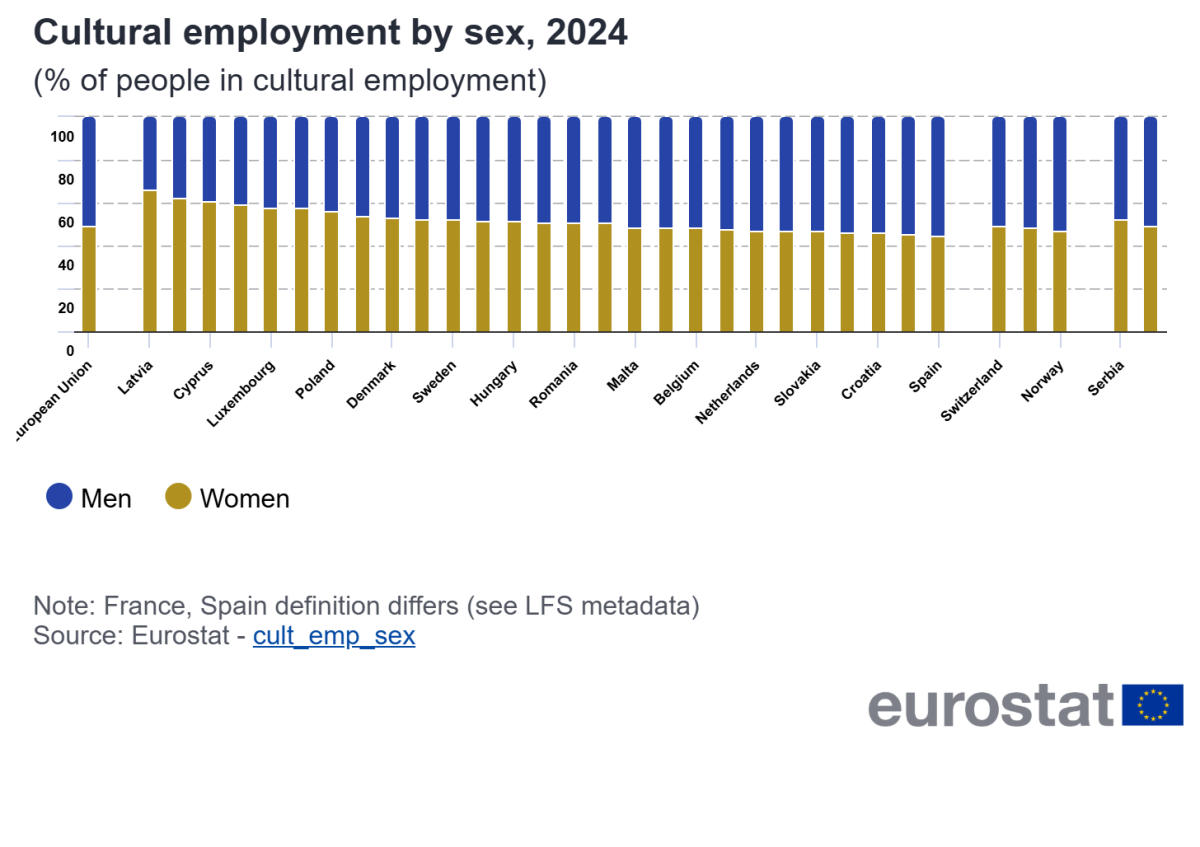 CCS have the highest self-employment share in the economy - Gender inequalities over full-time employmenbt are not CCS-specific
CCS have the highest self-employment share in the economy - Gender inequalities over full-time employmenbt are not CCS-specific
In 2024, self-employment was observed less for women (27.7%), than men (35.6%) in the CCS. However, compared to the rest of the economy, self-employment in the CCS is more than double, for both men and women. A low level of full-time work for men was observed in the CCS (81,9%) but not in the total economy (90.3%). For women, the level of full-employment was observed as low and lower than men in both the CCS (70%) and the total economy (70%).
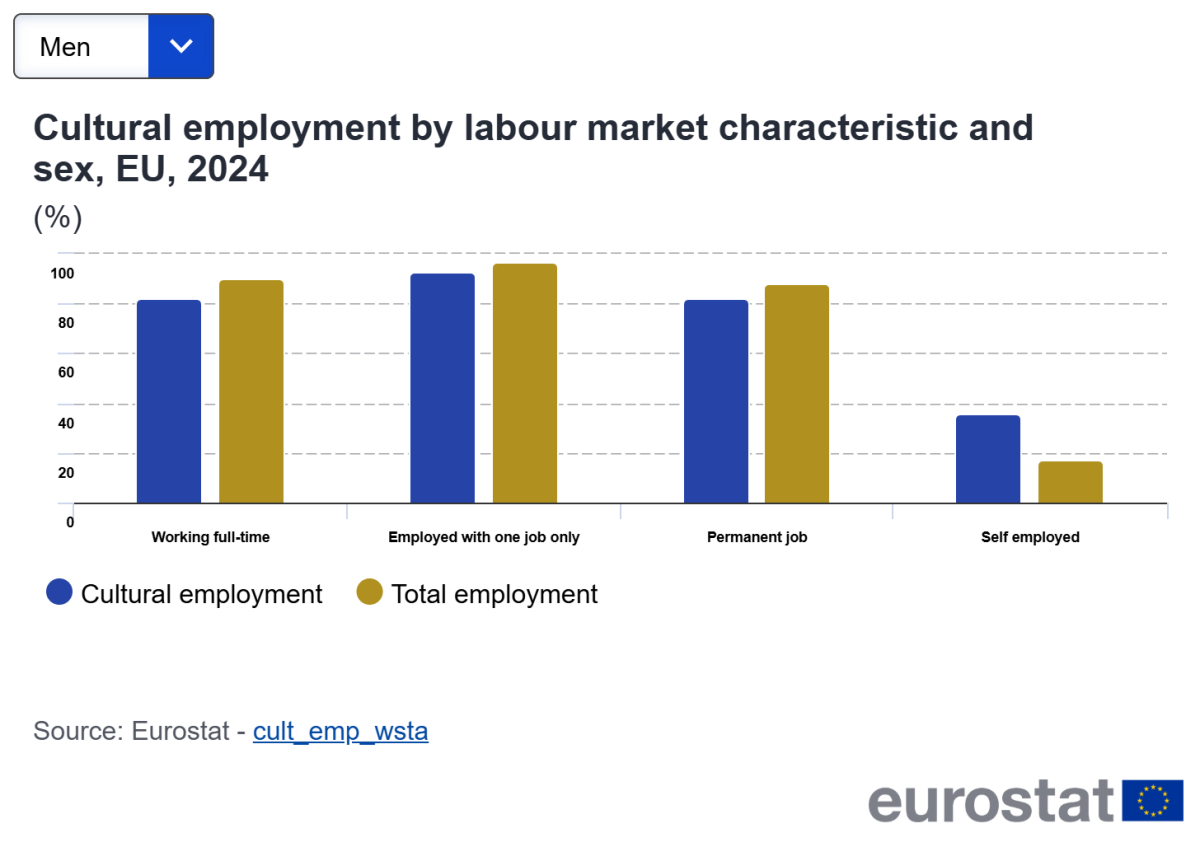
Gender Equality is near for Cultural Paricipation - There are Gender Differences in Purchases of Cultural Products Online
No strong gender inequalities on cultural participation
In 2022 there were differences on overall cultural participation across member states, as demonstrated in the following graph. In most EU countries, there were no high gender differences and a slight female prevalence in 17 from 26 countries with available data. The highest difference of 4.6% women prevalence was observed in Denmark, with 79.6% of women and 75% of men culturally participating. The highest rate of cultural participation for men was observed in Luxembourg (77.5%).
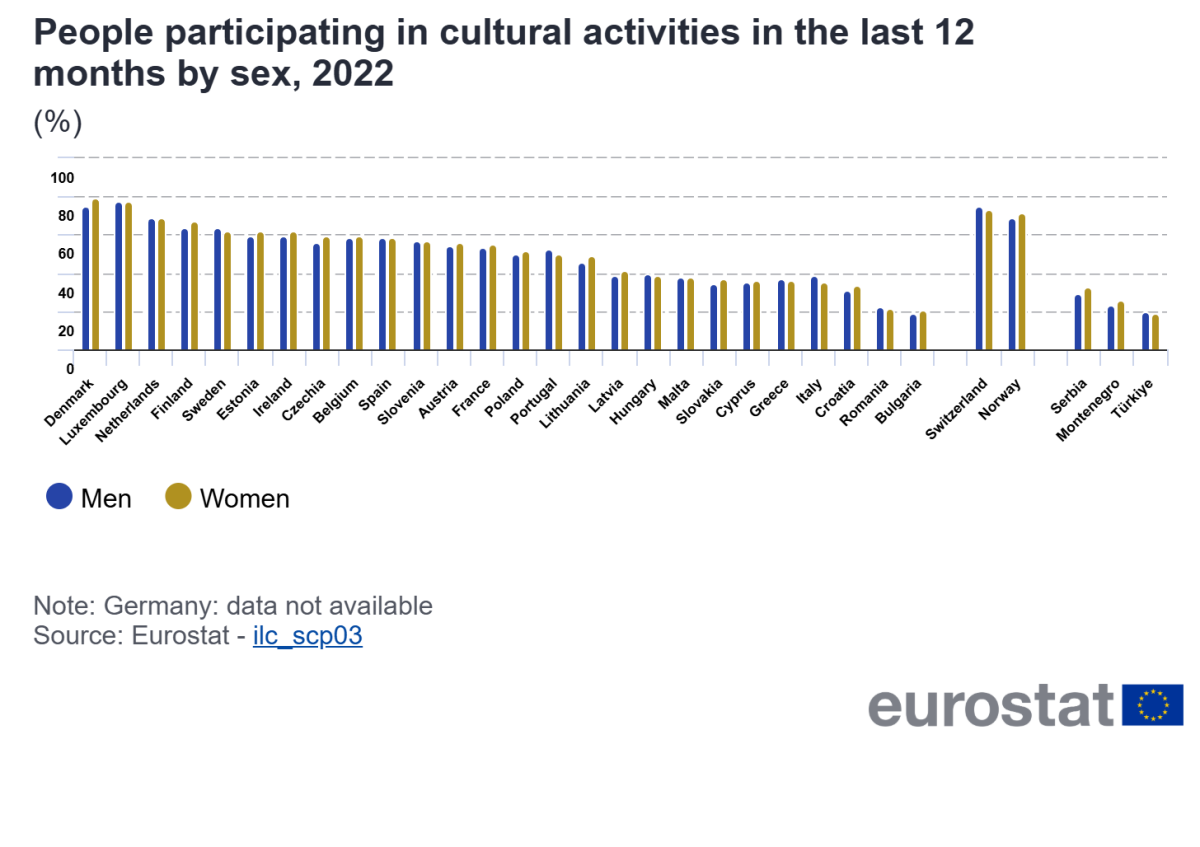
No gender differences on cinema and cultural sites - but women went more often to live events
Focusing on specific cultural activities, in 2022 there were no noticeable gender differences over going to the cinema or visiting cultural sites. This was not the case for live events, as in 24 of the 26 countries with available data, "women systematically reported more frequently having attended live events than men". The highest difference was observed in Czechia, with 38% of women reporting having attended a live cultural event at least once in the preceding 12 months compared with 28% of men.
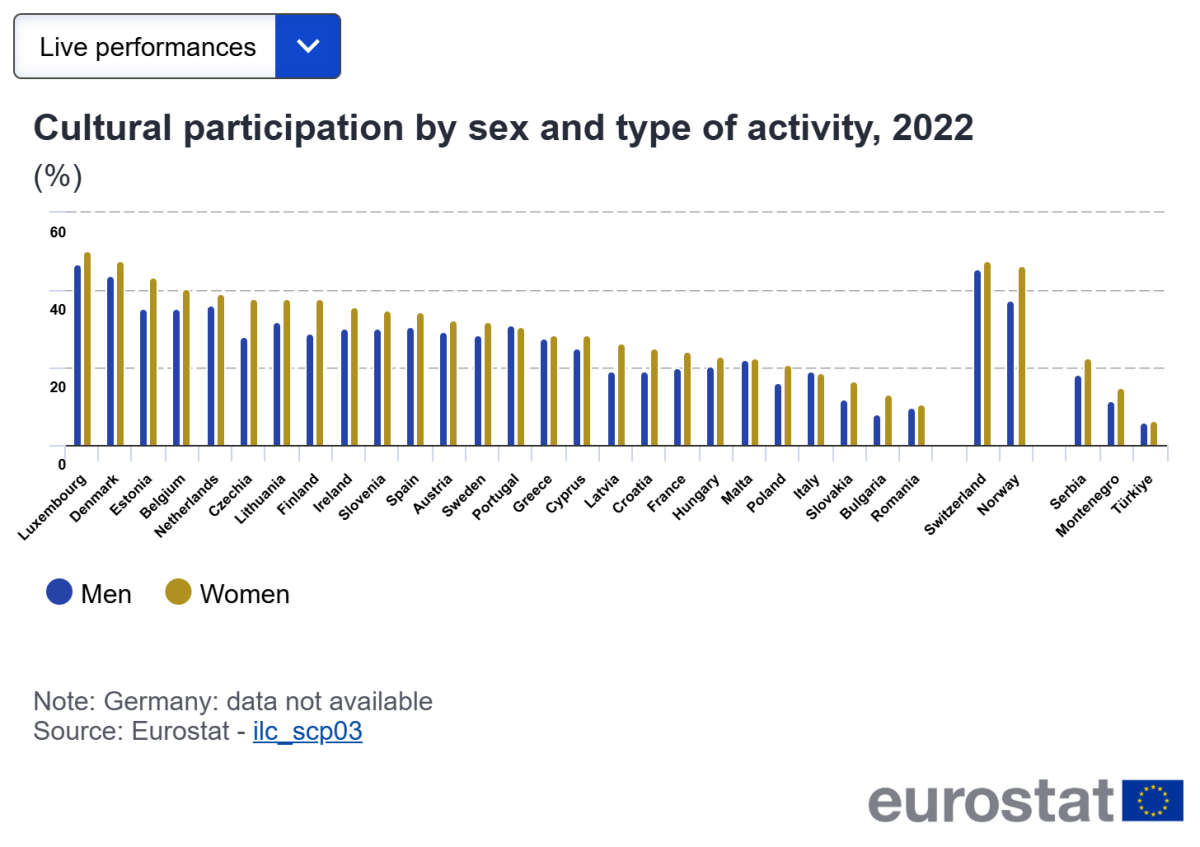 Overall, cultural participation was slightly higher for women in all age groups except for 65 and over. Cultural participation of women with some or severe activity limitations was higher than men, in 19 EU countries. "In Denmark, the Netherlands, Luxembourg and Finland more than half of both women and men with activity limitations participated in cultural activities".
Overall, cultural participation was slightly higher for women in all age groups except for 65 and over. Cultural participation of women with some or severe activity limitations was higher than men, in 19 EU countries. "In Denmark, the Netherlands, Luxembourg and Finland more than half of both women and men with activity limitations participated in cultural activities".
More women are book readers - and 'no interest' is the main reason for no book reading for both genders
In 2022, significantly more men (55.5%) than women (39.5%) reported not having read a single book in the last twelve months. More women than men read less than five books (28.8% against 24.8%), between five and nine books (14.3% against 9.8%), and more than ten books (17.4% against 9.9%).
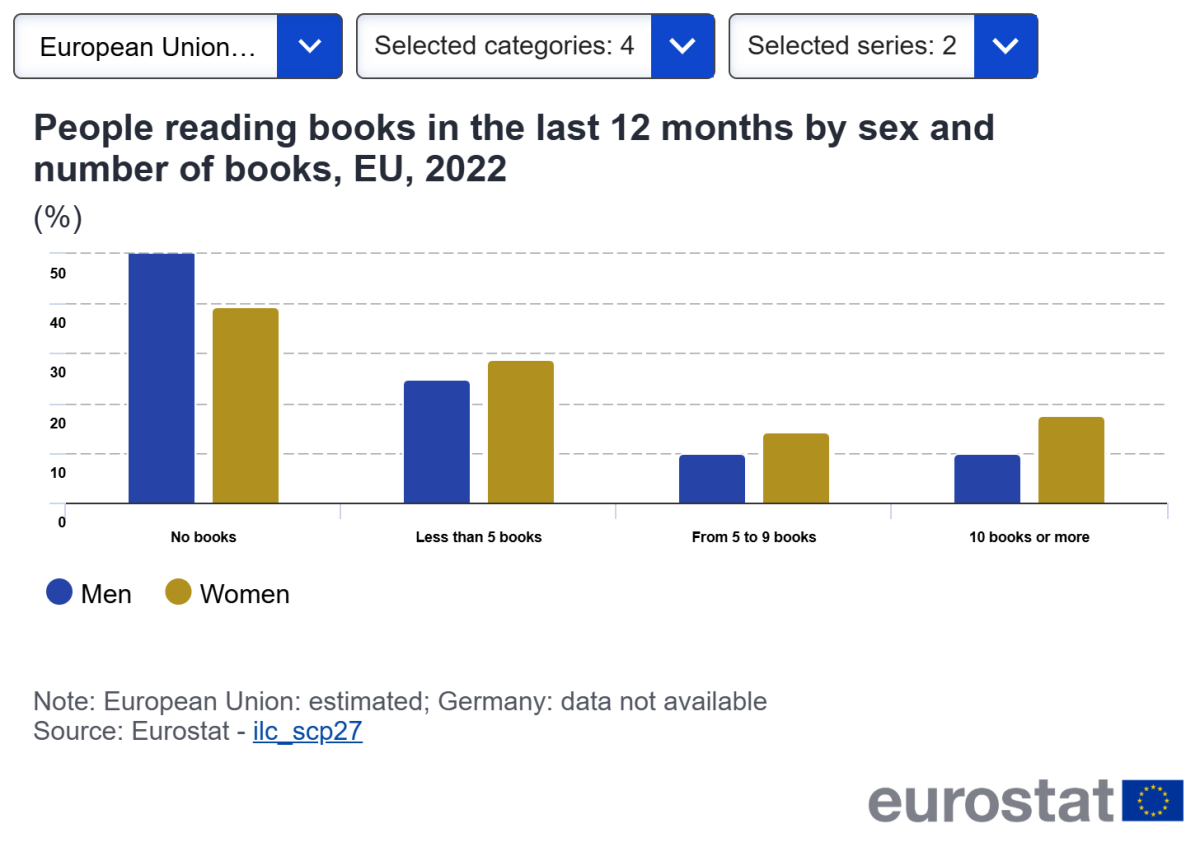 A share of 56.5% of men and 44.4% of women reported 'no interest' as the main reason for not reading a book, among other reasons including no time and financials.
A share of 56.5% of men and 44.4% of women reported 'no interest' as the main reason for not reading a book, among other reasons including no time and financials.
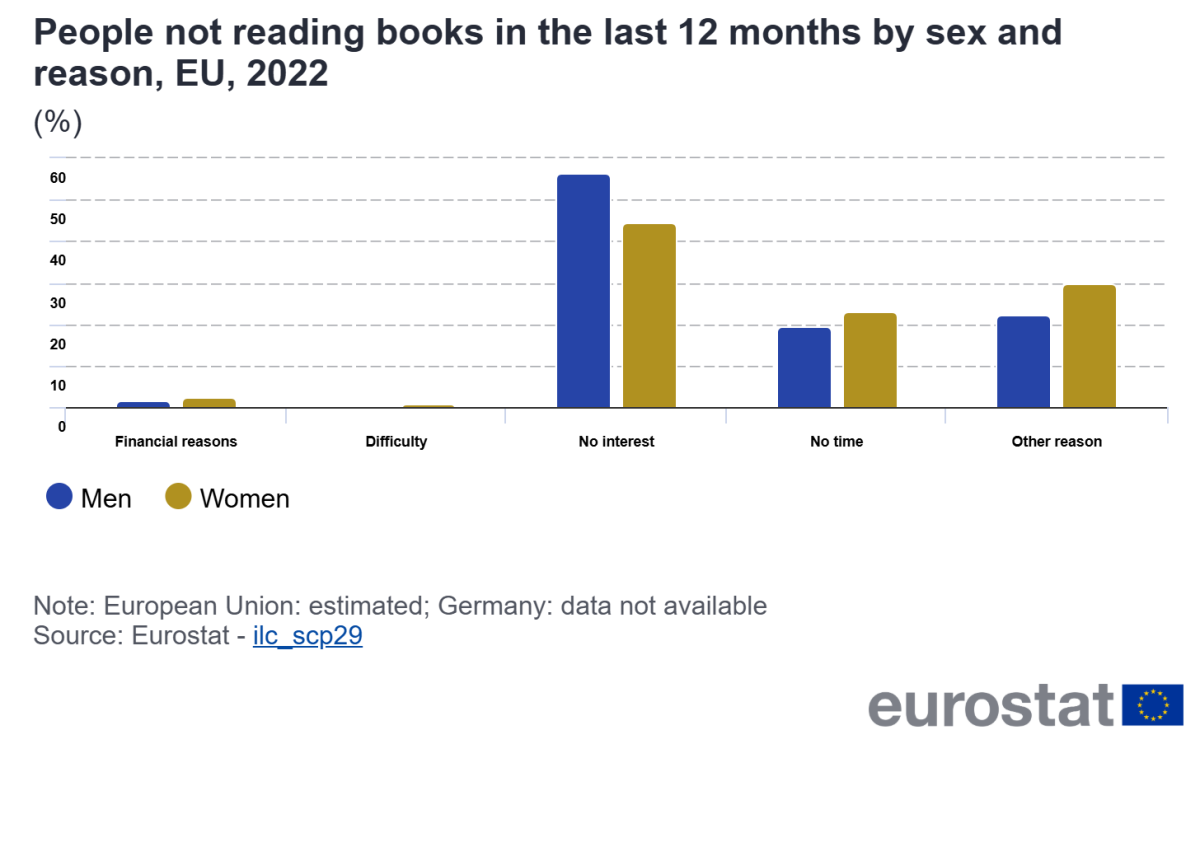
Women bought books and men films and games
"In 2024, women bought printed and electronic books more than men, while men used the internet to buy films or series to stream or download, and for gaming more than women".
Focusing on genders' cultural purchases online, in 2024, the most frequent categories of online cultural purchases for both genders, were paid subscriptions for films, series or sports streaming services, with a higher rate for men (31.4%) than women (28%). Second most popular was for both genders the online purchase of tickets to events, with a higher rate for women (25.4%) than men (24.2%).
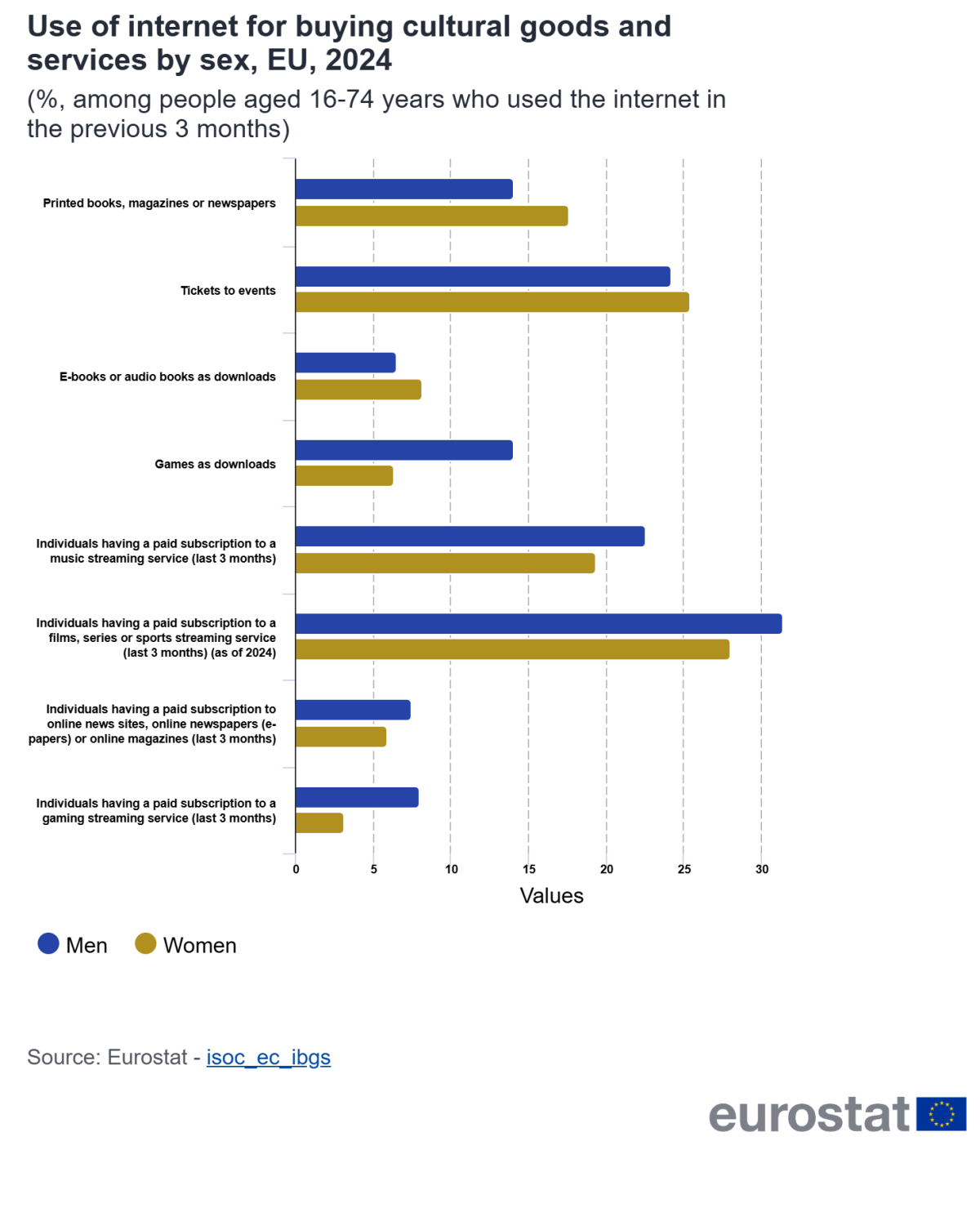 At EU level, women were more likely to purchase online both printed and digital publications, while men had a higher share in purchasing online video, music and videogames.
At EU level, women were more likely to purchase online both printed and digital publications, while men had a higher share in purchasing online video, music and videogames.
*Low-wage earners are defined as earners of two thirds or less of the national median gross hourly earnings for each member state.
Find more here
Image by Alexandr Ivanov - Free for use under the Pixabay Content License
Images 2-5 - Graphs - Courtesy of the EUROSTAT - Culture Statistics Publication








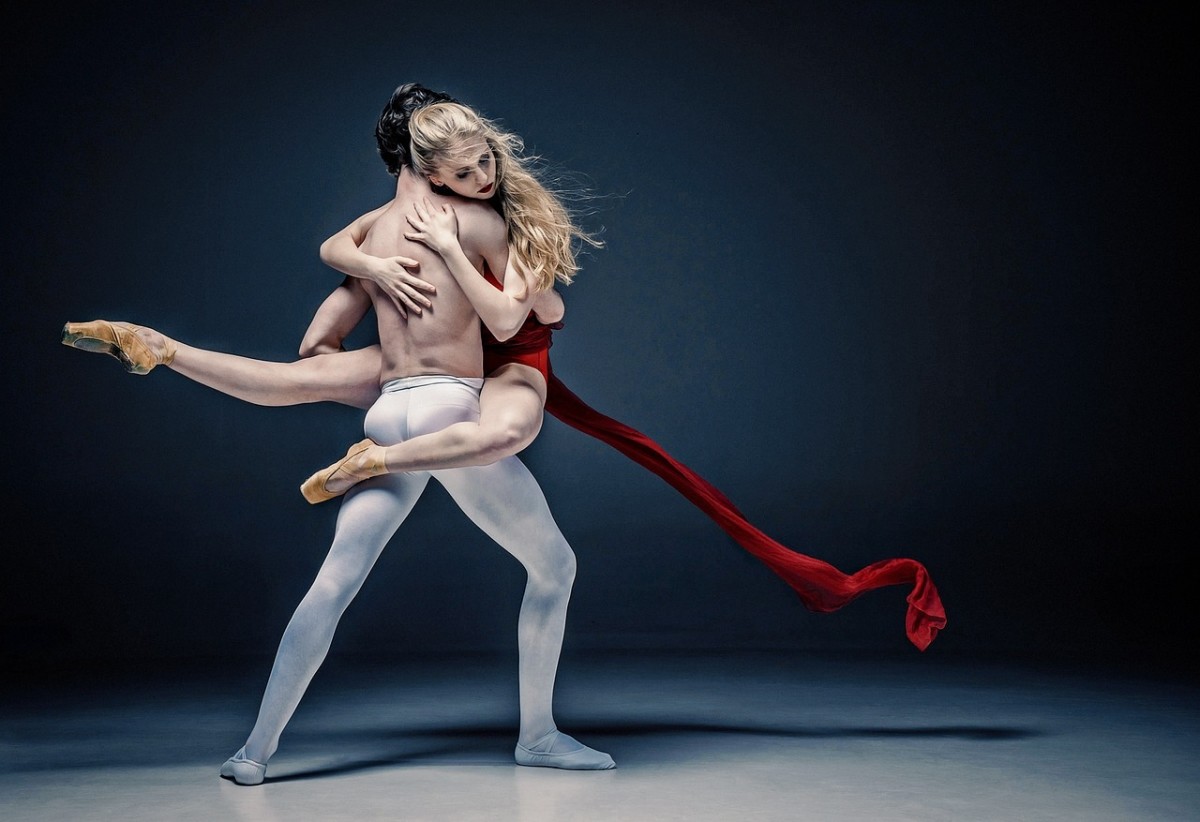
 More women are low-wage earners across all EU CCS
More women are low-wage earners across all EU CCS CCS employ more women in managerial positions than other economy sectors, yet still under 50%
CCS employ more women in managerial positions than other economy sectors, yet still under 50% Lowest Gender Employment Gap in 10 years but not in all member states
Lowest Gender Employment Gap in 10 years but not in all member states In 2024, the percentage of cultural employment was higher for women than men in 16 EU countries, with the highest difference reaching 32.6% in Latvia and 24.2% in Estonia.
In 2024, the percentage of cultural employment was higher for women than men in 16 EU countries, with the highest difference reaching 32.6% in Latvia and 24.2% in Estonia. CCS have the highest self-employment share in the economy - Gender inequalities over full-time employmenbt are not CCS-specific
CCS have the highest self-employment share in the economy - Gender inequalities over full-time employmenbt are not CCS-specific

 Overall, cultural participation was slightly higher for women in all age groups except for 65 and over. Cultural participation of women with some or severe activity limitations was higher than men, in 19 EU countries. "In Denmark, the Netherlands, Luxembourg and Finland more than half of both women and men with activity limitations participated in cultural activities".
Overall, cultural participation was slightly higher for women in all age groups except for 65 and over. Cultural participation of women with some or severe activity limitations was higher than men, in 19 EU countries. "In Denmark, the Netherlands, Luxembourg and Finland more than half of both women and men with activity limitations participated in cultural activities". A share of 56.5% of men and 44.4% of women reported 'no interest' as the main reason for not reading a book, among other reasons including no time and financials.
A share of 56.5% of men and 44.4% of women reported 'no interest' as the main reason for not reading a book, among other reasons including no time and financials.
 At EU level, women were more likely to purchase online both printed and digital publications, while men had a higher share in purchasing online video, music and videogames.
At EU level, women were more likely to purchase online both printed and digital publications, while men had a higher share in purchasing online video, music and videogames.